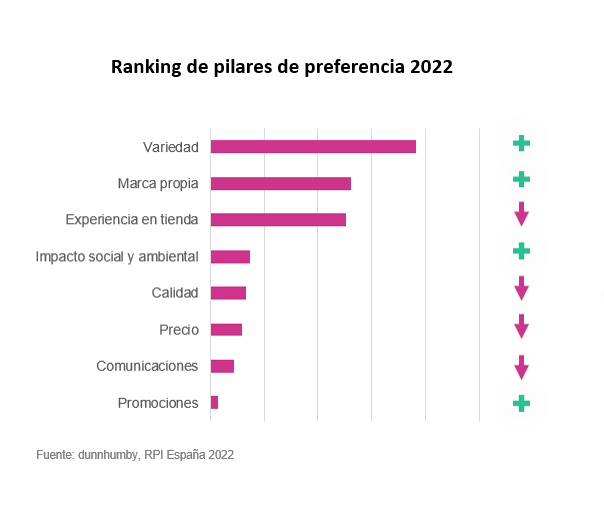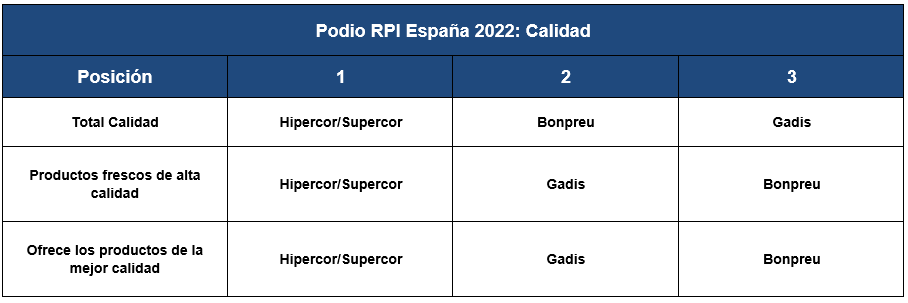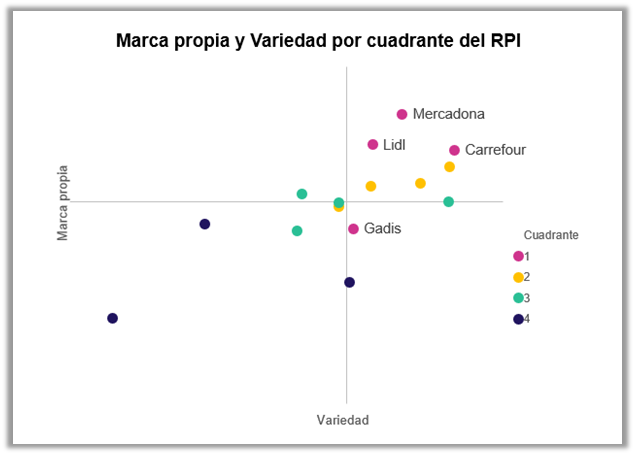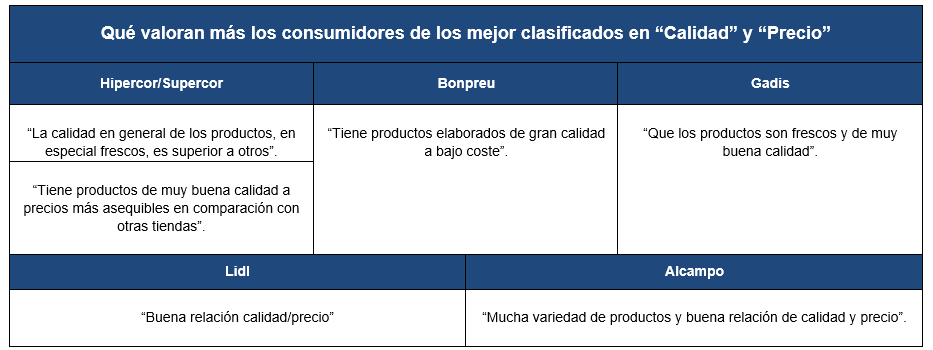¿Cuáles son las máximas prioridades para los consumidores españoles en lo que respecta a los retailers de alimentación?
Artículo #4: Precio y Calidad
La lógica nos dice que “Precio” y “Calidad” son 2 de los aspectos más importantes de la propuesta de valor de cualquier retailer. Sin embargo, los resultados del último Barómetro de preferencia del retail España (RPI)) de dunnhumby demuestran que ya no son tan decisivos como antes. En este artículo, Salvador Di Deco, Business Development Manager de dunnhumby en España, analizará cómo la naturaleza cambiante de las preferencias de los consumidores hace que precio y calidad sean temas difíciles de gestionar.
Percepción y realidad pueden ser cosas totalmente distintas, especialmente en lo que respecta a finanzas personales. Tomemos como ejemplo la inflación, que a día de hoy preocupa a la mayoría de consumidores de todo el mundo. El hecho de que escuchemos hablar constantemente de inflación y del aumento del coste de la vida ¿condiciona nuestra percepción de lo que en realidad sucede?
En el último estudio de nuestra serie de RPI para España, una pregunta que formulamos a los casi 3.000 participantes de todo el país fue cuánto creían que había aumentado la inflación a lo largo del último año. La conclusión es que la inflación percibida es 9,5 puntos superior a la real. En otros países la diferencia entre percepción y realidad es todavía mayor.
Por supuesto que la inflación ha aumentado y que, de forma correcta o no, el 71% de los consumidores españoles cree que ahora están pagando “mucho más” por sus alimentos que hace 12 meses. Teniendo esto en cuenta, es paradójico que “Precio” sea una preocupación relativamente baja.

Un elemento clave de nuestra serie de estudios RPI es lo que llamamos “Pilares de preferencia”: criterios de gran importancia que los clientes usan para decidir dónde comprar. En los artículos anteriores hemos analizado los más influyentes, como “Variedad”, “Marca propia” y “Experiencia en tienda”.
Cabría esperar que “Precio” ocupara un puesto más destacado en tiempos de inflación. Sin embargo, lo encontramos en 6º lugar. Por otra parte, “Calidad”, un factor que podríamos asumir que los consumidores sacrifican para poder ahorrar, está en el 5º. Entonces ¿qué es lo que está sucediendo?
Nuestra primera conclusión es que los consumidores españoles tienen una relación muy voluble con los precios. En los 3 anteriores barómetros hemos visto que “Precio” ocupaba el 5º lugar en 2019, el 2º en 2020, descendía al 4º en 2021 y actualmente ocupa el 6º. En un contexto tan complejo como el actual, parece que los precios no están entre las mayores preocupaciones.
La segunda conclusión, y quizá la más importante, es que no se puede decir lo mismo de “Calidad”. En todas nuestras investigaciones previas, nunca ha estado fuera del top 3, incluso cuando estaba incluida en un apartado mucho más amplio como “Experiencia en tienda” en 2019.
Con “Variedad” y “Marca propia” alcanzando lo más alto de estos Pilares de preferencia en el estudio de 2022, el mensaje que envían los consumidores es claro: la elección es su mejor defensa contra el aumento del coste de la vida. “Calidad” es algo que están dispuestos a sacrificar y “Precio” tiene poca importancia siempre y cuando la oferta de “Marca propia” les proporcione alternativas que les ayuden a ahorrar dinero.


Encontramos más pruebas que refuerzan esta hipótesis cuando comparamos las puntuaciones que obtienen los retailers en los pilares de “Precio” y “Calidad” con las que obtienen en el ranking general del RPI.
Lo normal es que los retailers que obtengan las mejores puntuaciones en aquello que más preocupa a los consumidores construyan relaciones más profundas con estos y logren mejores resultados comerciales. Esto mismo es lo que sucede si en el estudio de este año buscamos en la clasificación global a aquellos retailers que obtienen las mejores puntuaciones en “Variedad” y “Marca propia”.
Mercadona, Carrefour y Lidl, que ocupan los 3 primeros puestos en esos 2 pilares, también conforman el top 3 del ranking general. Sin embargo, aunque es cierto que los líderes en “Calidad” y “Precio” no están mal situados en los rankings generales, la relación no es tan directa como en el caso que acabamos de explicar. Una buena oferta en “Calidad” y “Precio” es positiva, pero no marca tanto las diferencias por sí misma.

En general, la actitud en España hacia “Calidad” y “Precio” contrasta con lo que sucede en muchos otros países. “Precio” está en el top 3 de preocupaciones en 7 de nuestros 11 estudios RPI más recientes. Aunque “Calidad” solo aparece algunas veces en este contexto, en muchos países la consideran como parte de la “Experiencia en tienda”.

De momento, la comparación más cercana que tenemos disponible es la del RPI de Italia 2022 que se elaboró casi al mismo tiempo que el español. Allí “Precio” (“Precio percibido”) es una de las preferencias más importantes, especialmente cuando se une a “Promociones”. Por su parte, “Calidad” (“Calidad del producto”) ocupa el 6º lugar en los rankings italianos, lo que reafirma la idea de que los consumidores pueden verla como un aspecto que sacrificar si es necesario.
¿Aumentará la importancia del precio a medida que las economías tengan que apretarse el cinturón aún más durante los próximos 12 meses? ¿Seguirá disminuyendo la importancia de la calidad si los consumidores necesitan continuar reduciendo sus costes? Es algo que está por ver. Lo que sí podemos decir es que tanto “Calidad” como “Precio” siguen siendo aspectos importantes, siempre y cuando se disponga de un amplio abanico de propuestas. Una vez analizados estos 2 factores, con nuestro siguiente y último artículo daremos por concluida la lista de los Pilares de preferencia del RPI 2022.
TOPICS
The latest insights from our experts around the world
Cómo retener a sus clientes
Marcas propias: sostenibilidad, diseño y valor premium
Cómo conquistar a tus clientes con el poder de las marcas propias



